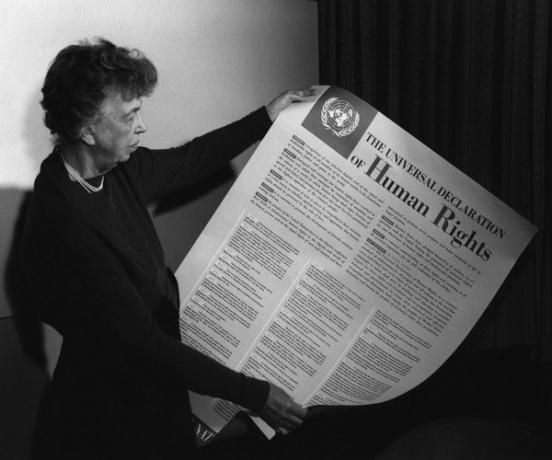The Universal Declaration of Human Rights (UDHR) is a document created to establish measures that guarantee basic rights for a decent life. The purpose of the Declaration is that human rights are guaranteed to all citizens of the world.
It is formed by ideals that should guide the behavior of all citizens, the actions of governments and the formation of laws to protect human rights. Its creation represents ideals of freedom of thought and expression and equality before the law.
The publication of the Declaration is considered one of the most important references of the protection of human rights at the world level because it serves as a guide for the conduct of citizens and governments.
What does the Universal Declaration of Human Rights say?
The document consists of an initial part (preamble) and thirty articles.
O preamble brings together the motivations for the creation of the Declaration, especially the protection of dignity and human rights, as one of the pillars of justice and world peace.
US articles the determinations for the protection of human rights are defined, such as: life, liberty, security, education, equality and freedom of expression.
Main rights provided for in the Universal Declaration of Human Rights
See the summary of articles in the Declaration:
- All human beings are free and equal in rights and dignity.
- Ability and freedom to live without discrimination.
- Right to life, freedom and security.
- No person should be enslaved.
- No one should be tortured or receive cruel treatment.
- Right of recognition as a person.
- Equality before the law.
- Right of access to justice when rights are violated.
- No one should be arbitrarily arrested.
- Everyone has the right to a fair trial.
- Right to the presumption of innocence until guilt is proven
- Protection of private and family life.
- Freedom of movement and freedom to leave and return to any country.
- Right to seek asylum in other countries.
- Right to have a nationality.
- Right to marriage and family.
- Property protection.
- Freedom of faith and religious practice.
- Freedom of expression and opinion.
- Freedom to participate in associations.
- Access to your country's government and public service.
- Right to the security and protection of the State.
- Right to work and unemployment protection.
- Right to rest and leisure.
- Standard of living that guarantees the health and well-being of the family.
- Right to education, free in fundamental years.
- Access to arts, culture and sciences.
- Right to live in a just and free society.
- Fulfillment of duties to the community, in accordance with the principles of the United Nations.
- Protection of rights set forth in the Declaration.
How did the Universal Declaration of Human Rights come about?
The Declaration began to be elaborated in the year of 1946, when the first ideas that gave rise to the document were presented at the General Assembly of the United Nations (UN).
Completion and approval took place some time later. The Declaration was officially adopted by the UN on December 10, 1948.
 Human rights activist Eleanor Roosevelt (1884-1962) chaired the United Nations Commission on Human Rights and was instrumental in the passage of the Declaration.
Human rights activist Eleanor Roosevelt (1884-1962) chaired the United Nations Commission on Human Rights and was instrumental in the passage of the Declaration.
Learn more about UN.
What are human rights?
Human rights encompass all the basic rights that must be guaranteed to citizens to enable them to enjoy dignity and citizenship.
This means that the concept of human rights involves the basic rights and freedoms necessary to guarantee a decent life for individuals.
These rights must be guaranteed to all people, regardless of any distinction, such as ethnicity, nationality, gender, religion or sexual orientation.
On human rights, the Declaration, right at the beginning, states:
The General Assembly proclaims this Universal Declaration of Human Rights as the common ideal to be attained by all peoples and all nations, with the objective that each individual and each body of society, always bearing in mind this Declaration, strive, through teaching and education, for to promote respect for these rights and freedoms, and, by adopting progressive measures of a national and international character, to ensure their recognition and its universal and effective observance, both among the peoples of the member states themselves, and among the peoples of the territories under their jurisdiction.
See more about the meanings of human rights and fundamental rights.
